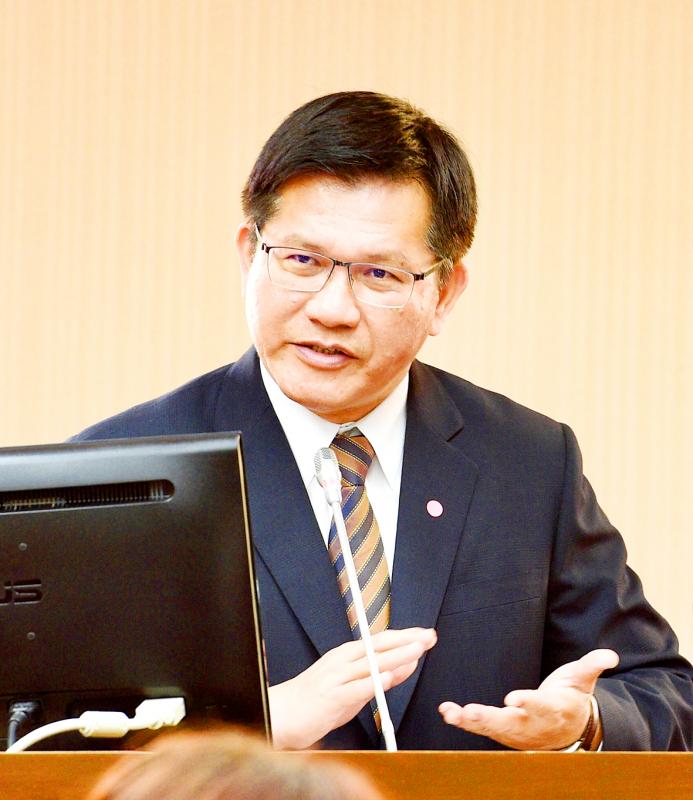The government would spend at least NT$30 billion (US$990.9 million) to bail out the nation’s airlines amid the COVID-19 pandemic, Minister of Transportation and Communications Lin Chia-lung (林佳龍) said yesterday.
The effects of the global coronavirus outbreak on the airline and tourism industries have been greater than what the Ministry of Transportation and Communications (MOTC) had estimated, Lin said on the sidelines of a meeting of the Legislative Yuan’s Transportation Committee, adding that the repercussions are expected to linger for some time.
The nation’s airlines have experienced financial difficulties, as an increasing number of countries restricting the entry of travelers to combat the pandemic has led to reductions to international flights, he said.

Photo: Peter Lo, Taipei Times
As airlines are large corporations and require significant operating capital, Lin said that the ministry has proposed that the Executive Yuan hold an interdepartmental meeting to discuss how the government can help over the next six months.
It would take at least NT$30 billion to bail out the nation’s six airlines and the ministry would help secure loans to replenish their working capital, he said.
The exact sum of such a bailout would be decided at a Cabinet meeting today, he added.
“We will also ask airlines to submit plans to improve their operations. In the past, they might have encountered problems that caused them to bear heavy financial burdens. This is particularly the case with the China Airlines,” Lin said.
“This is a perfect opportunity for China Airlines to address its operational issues. It cannot ask for a bailout without conducting corporate reform,” he added.
As travel agents are unable to organize tours, the government has helped them secure loans or provided subsidies, while NT$800 million has been budgeted for travel sector workers to upgrade their professional skills, and that amount could also be increased, he said.
The ministry has also budgeted NT$4.86 billion to assist airlines, duty-free shops and other service operators in the nation’s airports, including a NT$578 million disease prevention subsidy.
The Civil Aeronautics Administration on Tuesday night said that airlines could apply for assistance through the NT$4.86 billion buget, and that part of the funds would be used to subsidize interest on loans airlines obtain to pay workers’ salaries for one year.
The subsidy was calculated using the interest rate of a one-year Chunghwa Post savings account, the agency said.
The disease prevention subsidy would be used to purchase masks and ear thermometers, as well as to disinfect aircraft, it said.
The disease prevention subsidy is capped at NT$4,500 per international or cross-strait flight, and NT$2,500 for domestic flights, it added.
In other developments, Taiwan International Ports Corp said that it would offer cruise ship operators subsidies for nine months to pay for seaport terminal facility leasing fees under a program that would last until June 30 next year.
As soon as the Central Epidemic Command Center allows cruise ships to dock in Taiwan again, cruise ship operators would also receive a subsidy covering 50 percent of docking fees per voyage, it said.
Operators could receive incentives of between NT$2 million and NT$6 million per voyage if more than 30 percent of the passengers are non-Taiwanese, it said.

The manufacture of the remaining 28 M1A2T Abrams tanks Taiwan purchased from the US has recently been completed, and they are expected to be delivered within the next one to two months, a source said yesterday. The Ministry of National Defense is arranging cargo ships to transport the tanks to Taiwan as soon as possible, said the source, who is familiar with the matter. The estimated arrival time ranges from late this month to early next month, the source said. The 28 Abrams tanks make up the third and final batch of a total of 108 tanks, valued at about NT$40.5 billion

Two Taiwanese prosecutors were questioned by Chinese security personnel at their hotel during a trip to China’s Henan Province this month, the Mainland Affairs Council (MAC) said yesterday. The officers had personal information on the prosecutors, including “when they were assigned to their posts, their work locations and job titles,” MAC Deputy Minister and spokesman Liang Wen-chieh (梁文傑) said. On top of asking about their agencies and positions, the officers also questioned the prosecutors about the Cross-Strait Joint Crime-Fighting and Judicial Mutual Assistance Agreement, a pact that serves as the framework for Taiwan-China cooperation on combating crime and providing judicial assistance, Liang

A group from the Taiwanese Designers in Australia association yesterday represented Taiwan at the Midsumma Pride March in Melbourne. The march, held in the St. Kilda suburb, is the city’s largest LGBTQIA+ parade and the flagship event of the annual Midsumma Festival. It attracted more than 45,000 spectators who supported the 400 groups and 10,000 marchers that participated this year, the association said. Taiwanese Designers said they organized a team to march for Taiwan this year, joining politicians, government agencies, professionals and community organizations in showing support for LGBTQIA+ people and diverse communities. As the first country in Asia to legalize same-sex

MOTIVES QUESTIONED The PLA considers Xi’s policies toward Taiwan to be driven by personal considerations rather than military assessment, the Epoch Times reports Chinese President Xi Jinping’s (習近平) latest purge of the Chinese People’s Liberation Army (PLA) leadership might have been prompted by the military’s opposition to plans of invading Taiwan, the Epoch Times said. The Chinese military opposes waging war against Taiwan by a large consensus, putting it at odds with Xi’s vision, the Falun Gong-affiliated daily said in a report on Thursday, citing anonymous sources with insight into the PLA’s inner workings. The opposition is not the opinion of a few generals, but a widely shared view among the PLA cadre, the Epoch Times cited them as saying. “Chinese forces know full well that